
The Independent Voice for Agriculture
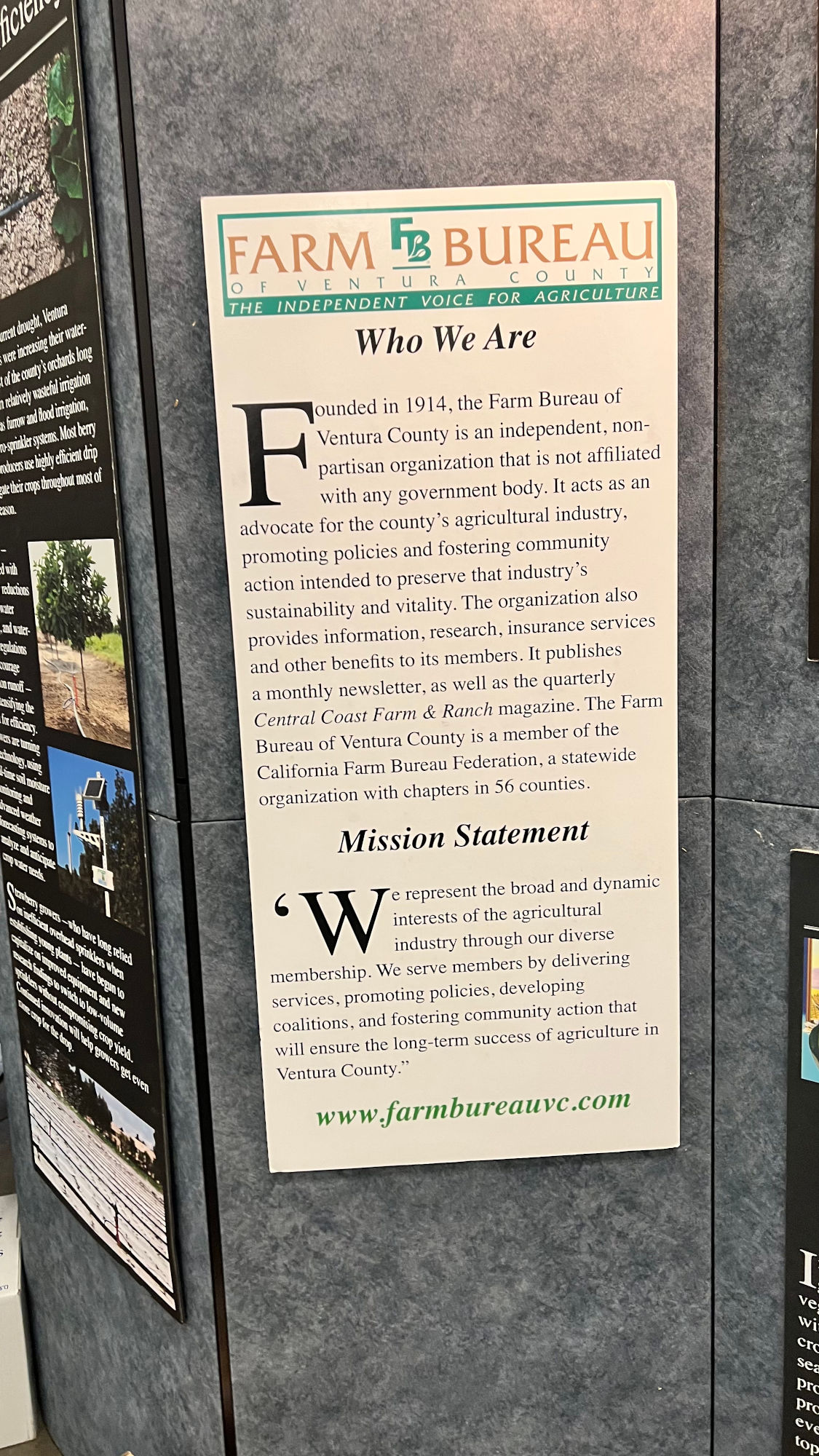
Who We Are
Founded in 1914, the Farm Bureau of Ventura County is an independent, non-partisan organization that is not affiliated with any government body.
It acts as an advocate for the county's agricultural industry, promoting policies and fostering community action intended to preserve that industry's sustainability and vitality.
The organization also provides information, research, insurance services and other benefits to its members.
It publishes a monthly newsletter, as well as the quarterly Central Coast Farm & Ranch magazine.
The Farm Bureau of Ventura County is a member of the California Farm Bureau Federation, a statewide organization with chapters in 56 counties Mission Statement
Mission Statement
We represent the broad and dynamic interests of the agricultural industry through our diverse membership.
We serve members by delivering services, promoting policies, developing coalitions, and fostering community action that will ensure the long-term success of agriculture in Ventura County.
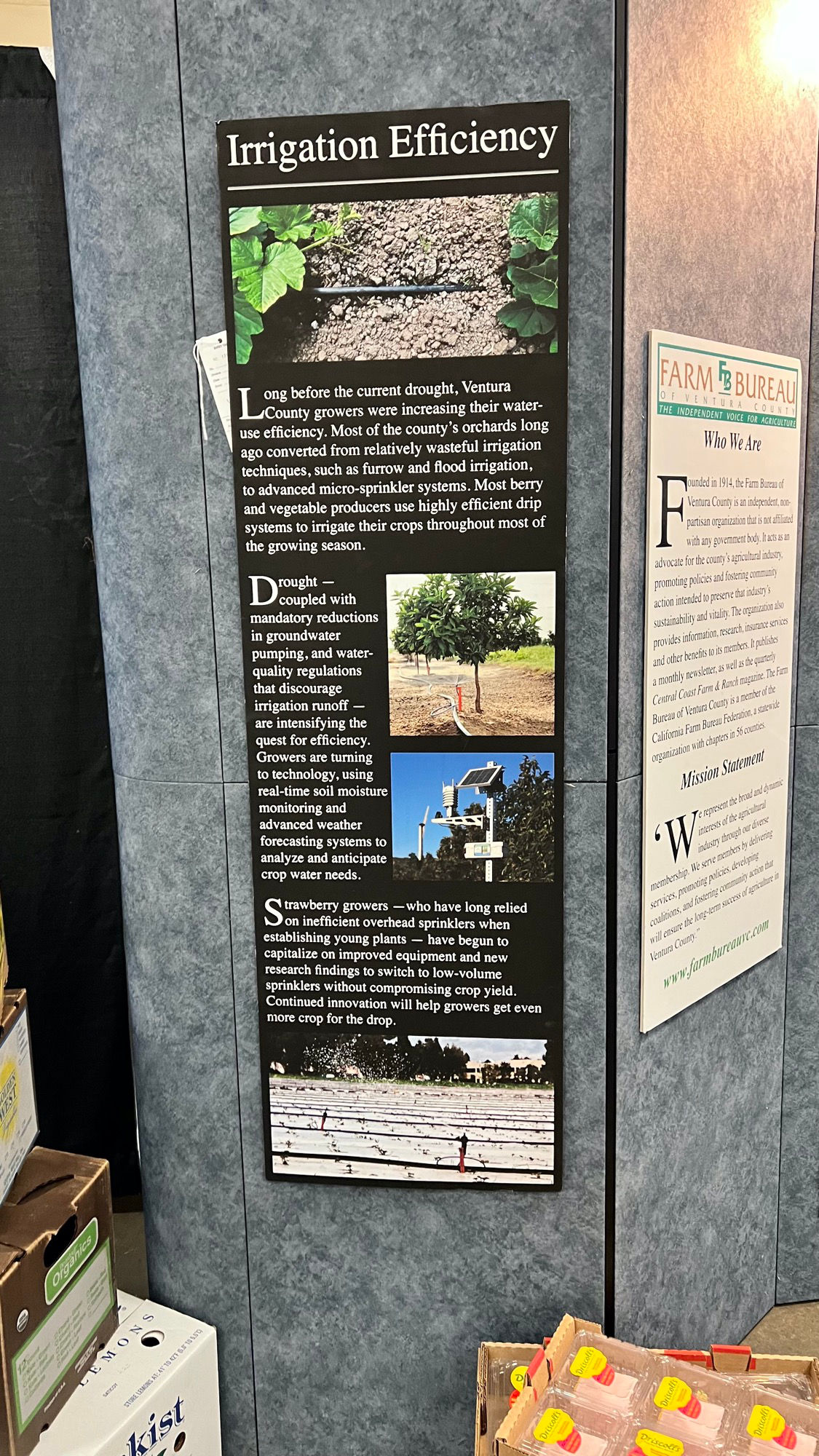
Long before the current drought, Ventura / County growers were increasing their water use efficiency. Most of the county's orchards long ago converted from relatively wasteful irrigation techniques, such as furrow and flood irrigation, to advanced micro-sprinkler systems. Most berry and vegetable producers use highly efficient drip systems to irrigate their crops throughout most of the growing season.
Drought coupled with mandatory reductions in groundwater pumping, and water quality regulations that discourage irrigation runoff are intensifying the quest for efficiency, Growers are turning to technology, using real-time soil moisture monitoring and advanced weather forecasting systems to analyze and anticipate crop water needs.
Strawberry growers - who have long relied on inefficient overhead sprinklers when establishing young plants - have begun to capitalize on improved equipment and new research findings to switch to low-volume sprinklers without compromising crop yield.
Continued innovation will help growers get even more crop for the drop.
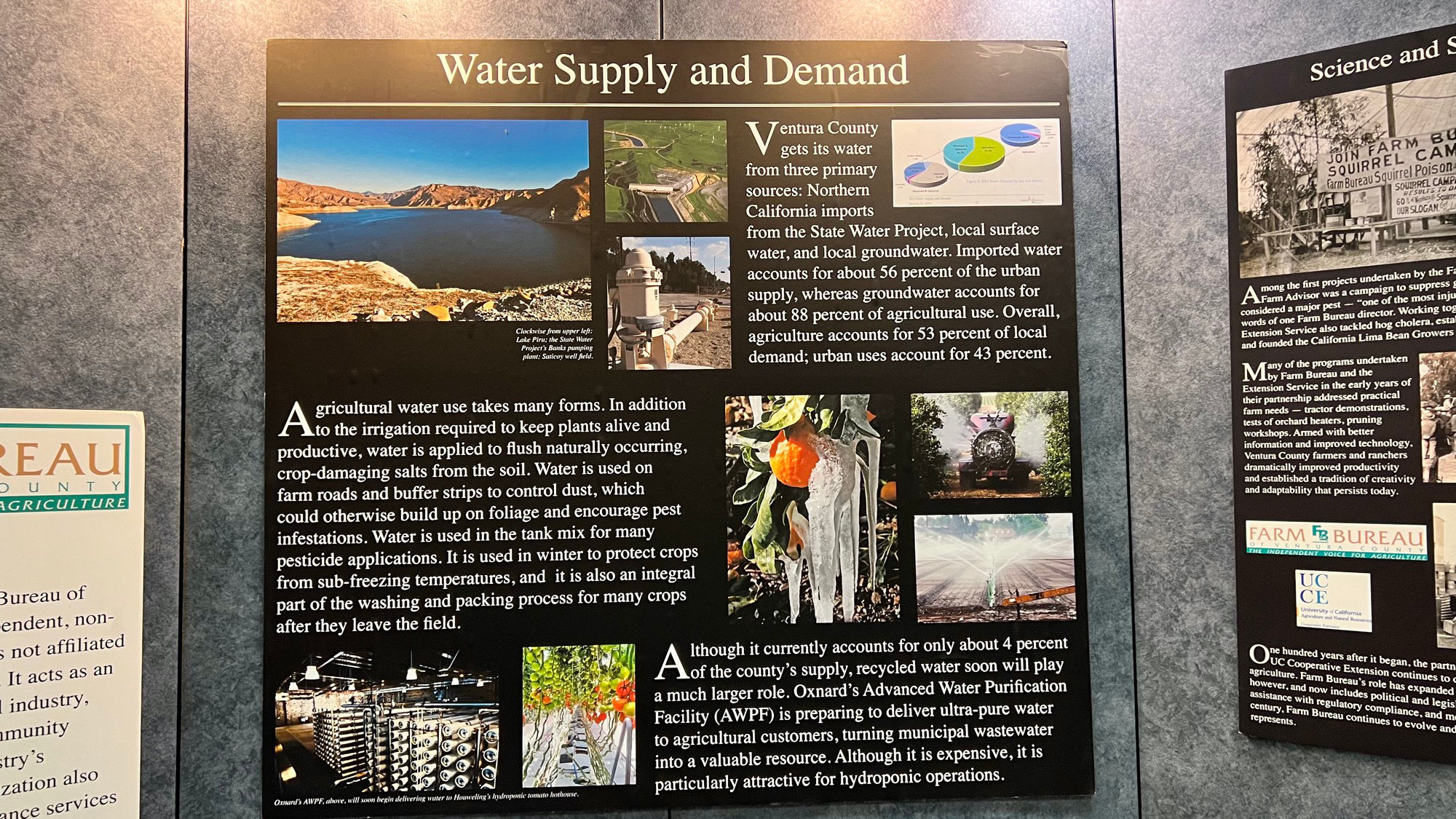
Ventura County gets its water from three primary sources:
- Northern California imports from the State Water Project
- local surface water
- local groundwater
Agricultural water use takes many forms. In addition to the irrigation required to keep plants alive and productive, water is applied to flush naturally occurring, crop-damaging salts from the soil. Water is used on farm roads and buffer strips to control dust, which could otherwise build up on foliage and encourage pest infestations. Water is used in the tank mix for many pesticide applications. It is used in winter to protect crops from sub-freezing temperatures, and it is also an integral part of the washing and packing process for many crops after they leave the field.
Although it currently accounts for only about 4 percent of the county's supply, recycled water soon will play a much larger role. Oxnard's Advanced Water Purification Facility (AWPF) is preparing to deliver ultra-pure water to agricultural customers, turning municipal wastewater into a valuable resource. Although it is expensive, it is particularly attractive for hydroponic operations.
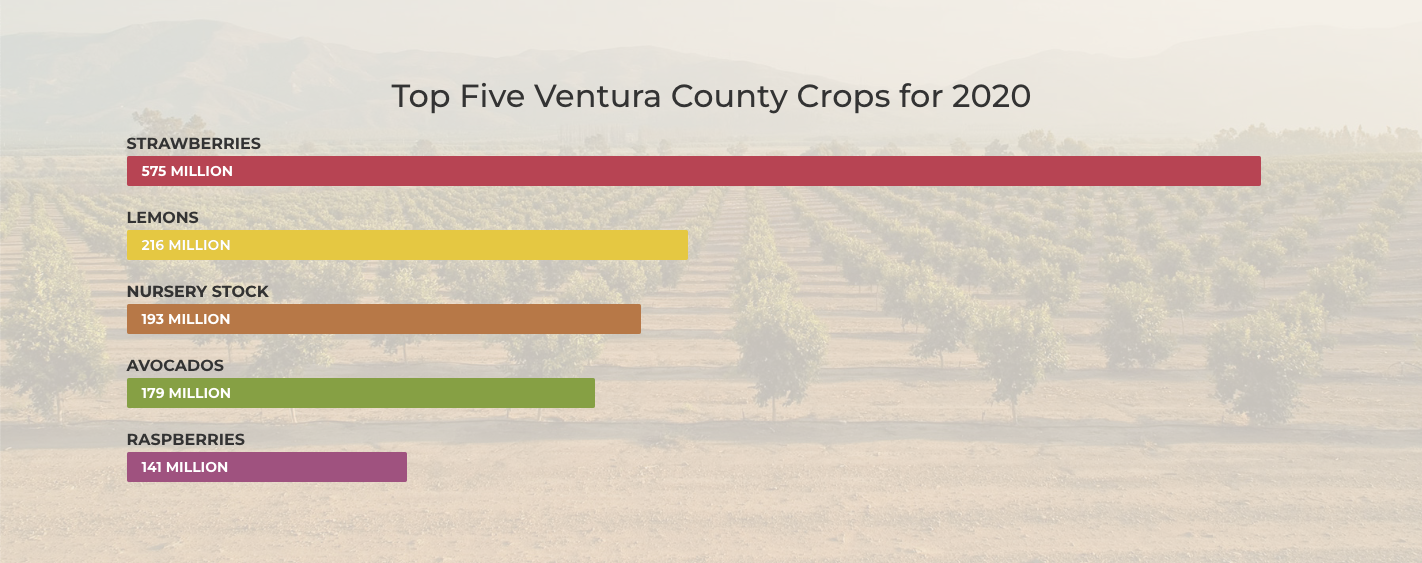
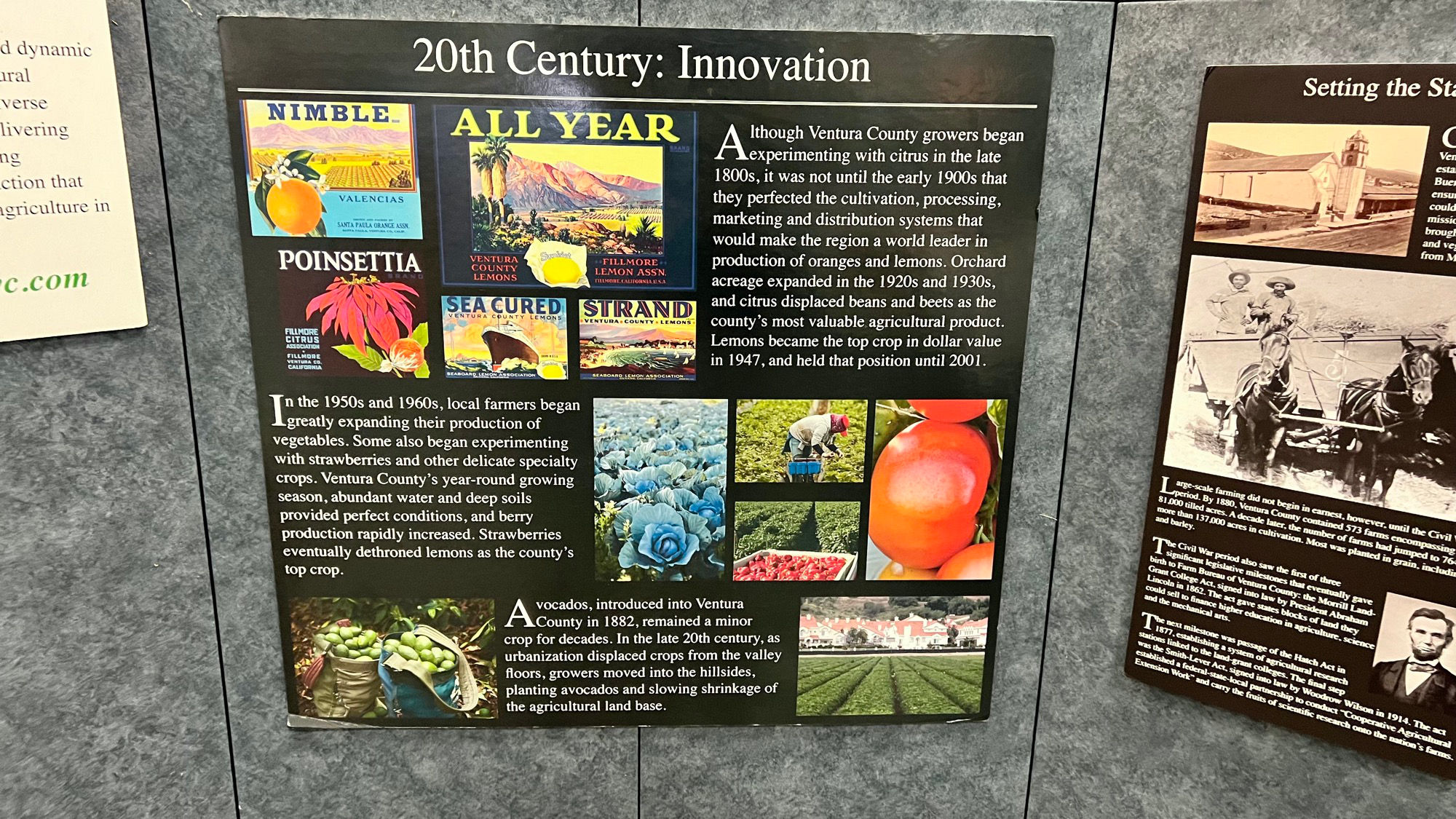
- Nimble
- Poinsettia
- All Year
- Sea Cured
- Strand
Although Ventura County growers began experimenting with citrus in the late 1800s, it was not until the early 1900s that they perfected the cultivation, processing, marketing, and distribution systems that would make the region a world leader in production of oranges and lemons. Orchard acreage expanded in the 1920s and 1930s, and citrus displaced beans and beets as the county's most valuable agricultural product. Lemons became the top crop in dollar value in 1947, and held that position until 2001.
Tn the 1950s and 1960s, local farmers began greatly expanding their production of vegetables. Some also began experimenting with strawberries and other delicate specialty crops. Ventura County's year-round growing season, abundant water and deep soils provided perfect conditions, and berry production rapidly increased. Strawberries eventually dethroned lemons as the county's top crop.
Avocados, introduced into Ventura County in 1882, remained a minor crop for decades. In the late 20th century, as urbanization displaced crops from the valley floors, growers moved into the hillsides, planting avocados and slowing shrinkage of the agricultural land base.
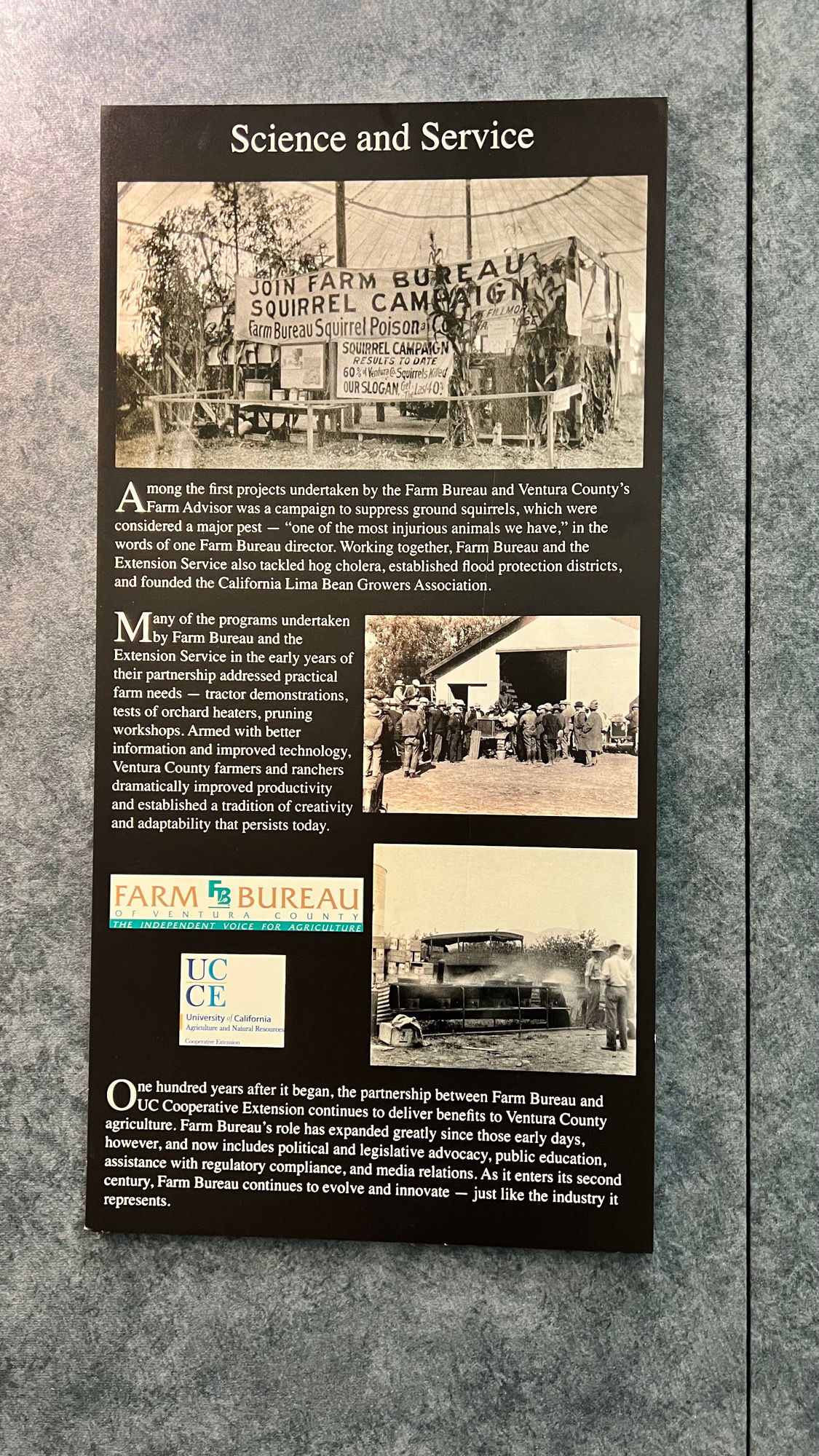
Among the first projects undertaken by the Farm Bureau and Ventura County's Farm Advisor was a campaign to suppress ground squirrels, which were considered a major pest - "one of the most injurious animals we have," in the words of one Farm Bureau director. Working together, Farm Bureau and the Extension Service also tackled hog cholera, established flood protection districts, and founded the California Lima Bean Growers Association.
Many of the programs undertaken Extension Service in the early years of their partnership addressed practical farm needs - tractor demonstrations, tests of orchard heaters, pruning workshops. Armed with better information and improved technology, Ventura County farmers and ranchers dramatically improved productivity and established a tradition of creativity and adaptability that persists today.
One hundred years after it began, the partnership between Farm Bureau and UC Cooperative Extension continues to deliver benefits to Ventura County agriculture. Farm Bureau's role has expanded greatly since those early days, however, and now includes political and legislative advocacy, public education, assistance with regulatory compliance, and media relations. As it enters its second century, Farm Bureau continues to evolve and innovate - just like the industry it represents.
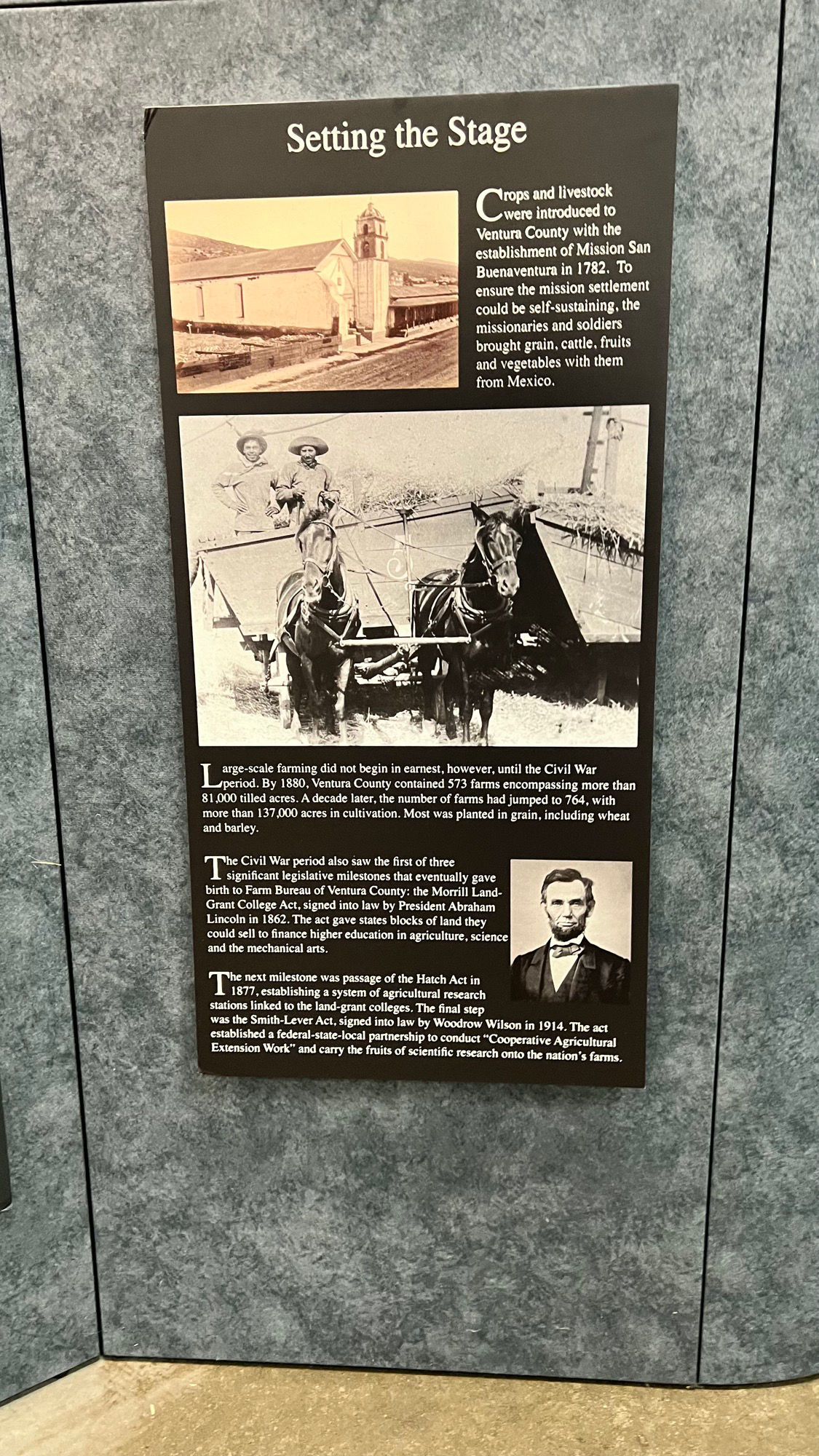
Crops and livestook were introduced to Ventura County with the establishment of Mission San Buenaventura in 1782. To ensure the mission settlement could be self-sustaining, the missionaries and soldiers brought grain, cattle, fruits and vegetables with them from Mexico.
Large-scale farming did not begin in earnest, however, until the Civil War period. By 1880, Ventura County contained 573 farms encompassing more than 81,000 tilled acres. A decade later, the number of farms had jumped to 764, with more than 137,000 acres in cultivation. Most was planted in grain, including wheat and barley.
The Civil War period also saw the first of three significant legislative milestones that eventually gave birth to Farm Bureau of Ventura County: the Morrill Land- Grant College Act, signed into law by President Abraham Lincoln in 1862. The act gave states blocks of land they could sell to finance higher education in agriculture, science and the mechanical arts.
The next milestone was passage of the Hatch Act in 1877, establishing a system of agricultural research stations linked to the land-grant colleges. The final step was the Smith-Lever Act, signed into law by Woodrow Wilson in 1914. The act established a federal-state-local partnership to conduct "Cooperative Agricultural Extension Work" and carry the fruits of scientific research onto the nation's farms.

- Save Your Community's Citrus
- AgAlert
- Ready, Set, Go!
Wildfire Preparedness for Farmer, Ranchers, and Growers - AgVentura
- Help when you need it most
Farm Bureau of Ventura County:
Ventura County agriculture has a long, rich and dynamic heritage. Crops have been grown commercially here since the mid-1800s; for most of a century, farming and ranching were the single most important economic activity in the region.Agriculture’s economic role has diminished, but farming still shapes the county’s landscape and culture to a degree that is unique in coastal Southern California. The remarkable fact that there remains an acre of irrigated farmland in Ventura County for every acre of city - despite the county’s proximity to a sprawling metropolis of nearly 18 million people - means that farming plays a critical role in maintaining the quality of life Ventura County residents cherish. This means that everyone living in the county has a stake in agriculture’s success.
Farm Bureau of Ventura CountyAs an advocate for the county's agricultural industry, we promote policies and foster community action intended to preserve the industry’s sustainability and vitality.For more than a century, Farm Bureau of Ventura County has been dedicated to ensuring that farmers and ranchers survive and thrive. As an advocate for the county’s agricultural industry, we promote policies and foster community action intended to preserve this industry’s sustainability and vitality. We are an independent, non-partisan organization that is not affiliated with any government entity. Our members include a broad cross-section of the agricultural community, from the smallest operations to the largest, both conventional and organic, producing more than 100 commodities.
Farm Bureau of Ventura CountyBorn in 1914. Although the organization has changed a great deal over the past century, its core mission – to represent, serve and support local agriculture – has not.https://www.farmbureauvc.com





